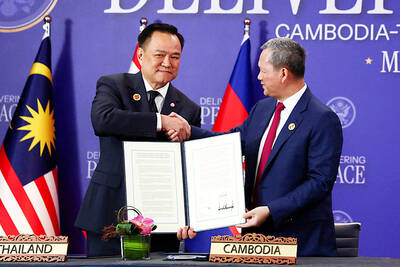New Zealand honey producers have lost their latest battle to trademark manuka honey, the latest blow in a yearslong fight to stop Australian beekeepers using the lucrative name.
The Intellectual Property Office of New Zealand yesterday ruled that New Zealand manuka beekeepers’ attempt for a trademark did not meet necessary requirements, and the term manuka was descriptive.
Manuka refers to a white flowered tree that grows in both New Zealand and Australia, although it is more widely known as “tea tree” in Australia. The bees that browse its tiny pale blooms produce a kind of honey known for antibacterial and supposed health properties — and which fetches a significant price markup on the international market as a result.
At the highest concentrations, some New Zealand batches have fetched up to NZ$2,000 to NZ$5,000 (US$1,258 to US$3,144) for a 250g jar at luxury stores overseas. The lucrative nature of the product has been responsible for outbreaks of crime in New Zealand, with fierce competition over access to manuka forests spurring mass poisonings of bees, thefts, vandalism and beatings.
However, for more than a decade, the two countries have been at loggerheads over the use of the manuka name — a Maori word, which New Zealand says is an indigenous treasure, uniquely associated with its own honey production. ]
Manuka Charitable Trust chair Pita Tipene said the decision was “disappointing in so many ways.”
He said the trust would pause to regroup, before continuing its battle.
“If anything, it has made us more determined to protect what is ours on behalf of all New Zealanders and consumers who value authenticity,” he said.
“Our role as kaitiaki [guardians] to protect the mana [dignity] and value of our taonga [treasured] species, including manuka on behalf of all New Zealanders is not contestable,” he said.
Australian industry players welcomed the decision as a “common sense outcome” and issued a press release saying they had plans to grow international sales in response to rising demand.
Australian Manuka Honey Association chairman Ben McKee said he was “delighted” by the ruling.
“Our product has a long history of being recognized as manuka honey; it is produced like the NZ product is, and it also offers the sought-after antimicrobial properties that consumers around the world value so highly,” he said.
New Zealand producers first tried to trademark the term in 2015.
The Intellectual Property Office of New Zealand called the fight “a trans-Tasman tussle of extraordinary proportions” and said in its ruling that it was “one of the most complex and long-running proceedings to have come before the Intellectual Property Office.”
The latest decision follows a similar 2021 ruling from the UK to not grant trademark status.

Shamans in Peru on Monday gathered for an annual New Year’s ritual where they made predictions for the year to come, including illness for US President Donald Trump and the downfall of Venezuelan President Nicolas Maduro. “The United States should prepare itself because Donald Trump will fall seriously ill,” Juan de Dios Garcia proclaimed as he gathered with other shamans on a beach in southern Lima, dressed in traditional Andean ponchos and headdresses, and sprinkling flowers on the sand. The shamans carried large posters of world leaders, over which they crossed swords and burned incense, some of which they stomped on. In this

‘NO COUNTRY BUMPKIN’: The judge rejected arguments that former prime minister Najib Razak was an unwitting victim, saying Najib took steps to protect his position Imprisoned former Malaysian prime minister Najib Razak was yesterday convicted, following a corruption trial tied to multibillion-dollar looting of the 1Malaysia Development Berhad (1MDB) state investment fund. The nation’s high court found Najib, 72, guilty on four counts of abuse of power and 21 charges of money laundering related to more than US$700 million channeled into his personal bank accounts from the 1MDB fund. Najib denied any wrongdoing, and maintained the funds were a political donation from Saudi Arabia and that he had been misled by rogue financiers led by businessman Low Taek Jho. Low, thought to be the scandal’s mastermind, remains

Near the entrance to the Panama Canal, a monument to China’s contributions to the interoceanic waterway was torn down on Saturday night by order of local authorities. The move comes as US President Donald Trump has made threats in the past few months to retake control of the canal, claiming Beijing has too much influence in its operations. In a surprising move that has been criticized by leaders in Panama and China, the mayor’s office of the locality of Arraijan ordered the demolition of the monument built in 2004 to symbolize friendship between the countries. The mayor’s office said in

FIGHTING CONTINUES: Thai military dropped 40 bombs on border areas, Cambodia said, while Bangkok said Phnom Penh launched heavy attacks and damaged homes Cambodia yesterday accused Thailand of intensifying its bombardment of disputed border areas, even as officials from the two countries attend a multi-day meeting aimed at negotiating an end to deadly clashes. The neighbors’ long-standing border conflict reignited this month, shattering an earlier truce and killing more than 40 people, according to official counts. About 1 million people have also been displaced. Cambodian and Thai officials were in their third day of talks at a border checkpoint, with ministers of defense from the two countries scheduled to meet today. However, the Cambodian Ministry of National Defense said Thailand’s military carried out a heavy